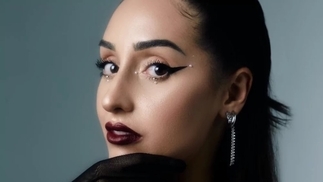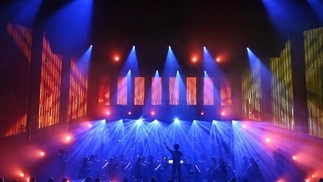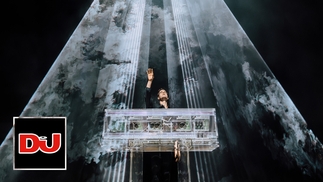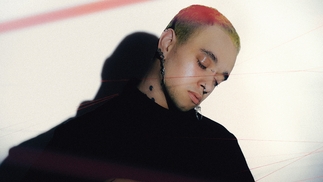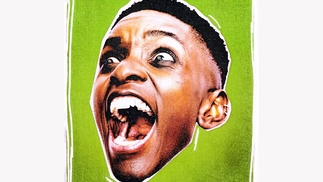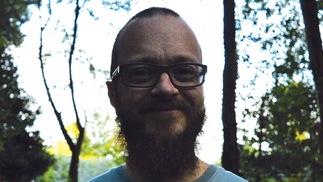BREAKING BAD
Break — one of the most prolific producers in d&b

Since 2001, with crucial releases for Eastside, No U-Turn, Ram, Metalheadz, Shogun, Exit, Critical, Quarantine, Subtitles and a host of others, Break — aka Charlie Bierman — has busily carved out his own unique space at the cutting edge of drum and bass. Break's crisp beats, sumptuous sampladelia and instinctive genius with sound has meant his skills have been utilised on a host of stunning re-rubs including Shy FX’s ‘Bambaataa’, Die’s ‘Clear Skyz’, Commix’s ‘Talk To Frank’ and Ram Trilogy’s ‘Gridlock’, as well as Bloc Party’s UK top five hit ‘The Prayer’.
As a DJ, Break is constantly on tour, playing across the globe from Fabric, Detonate, Bedlam, Warning, Metalheadz and Hospitality in the UK to the USA, Australia, New Zealand, Japan and throughout Europe, including headline shows and sets with the likes of Die, Goldie and Dillinja. In 2006 he launched his own imprint, Symmetry Recordings, continuing to hone his sound and releasing his first album, also entitled ‘Symmetry’, in 2008 — an album so diverse that tracks were picked up by Laurent Garnier and Josh Wink. His second LP 'Resistance' in 2010 featured collaborations with No U-Turn mastermind Nico, Bristol’s DJ Die, super-duo Calyx & Teebee, DNAudio cohorts Silent Witness and Survival, Shogun Audio’s SpectraSoul and vocalists Kyo and SP:MC. We grabbed a few words with one of the scene's prime movers to ask him how he got here, and where the hell he thinks he's going in 2013...
There's something about the beats in your music that to me comes more from hip-hop and dub than d&b, am I barking up the wrong tree?
“That's totally the musical background I'm coming from. The music I was massively into aged 16/17 was mainly hip-hop — I loved Premo, Tribe Called Quest, and still do. Still to this day I'll always seek a good sample rather than just play something on a synth — a sample just has more flava than a synth. If I want a string sound, say, I'd rather hunt around, dig through second-hand vinyl or the internet for a sample because there's something about the warmth and the feel you get from samples that's just irreplaceable.”
Do you think that desire for 'warmth and feel' comes from the fact that you started out as a drummer, a live 'real' musician?
“It definitely has an effect, I think any musician will always remember the first time they stood in the same room as a drum-kit and heard it being played. I guess I've always been subconsciously moved by that kind of natural power, always going back to it because I miss it.”

Like your bud Rockwell, the first kind of music you were heavily into was rock. Do you think that gives your music its sense of motivation, the fact that you don't just churn stuff out?
“When I was a kid I was just into pop, Michael Jackson, chart stuff. My first musical obsessions were Metallica and Rage Against The Machine, and I think RATM fed me into hip-hop. I can't make music by numbers, just knock it out like it's product and I'm doing a day-job. I couldn't enjoy music that way.
“It comes down to whether you want to play it safe or not. You can load up the same things you've used before and you'll hit a better average — your tracks won't blow up but they'll be consistent for a while but I'd rather take a gamble pushing forward into sounds and music I've never made before — keep things moving. The risk, of course, is that if you go too far out on a limb you might alienate everyone but I think I keep the right balance, keeping my style and sound but always progressing.”
Do you SEE sound?
“I don't get those colours that some producers get but I do see the shape and structure of a track as I'm making it, aim towards a certain form — for me it's like drawing and painting. The true masters in art actually do create work that is similar, but if you look at the pieces closer you realise they're all different, whilst still maintaining a constant style. That's my attitude towards sound.”
Can you ever turn off your musical sense?
“I can, there comes a moment where I just think I've been staring at a screen and have been listening/creating too long, and I can just turn the telly on and turn off and chill out. I do hear things in the street though that I'd love to use — closest I've got to that is the track I did with Nico, 'Salvage'. He bought all kinds of field recordings he'd done of drum processions and theme parks and they all got woven into the track. That's something I'd like to pursue more by myself in the future.”

Is drum and bass a type of music or just a tempo?
“It's both. There can be music at 170+ that isn't drum and bass. I'd say d&b has an ethos and a history that can't just be reduced to a tempo — it's a shared history among the people making it, a shared listening, a shared upbringing. What's changed is the sources it pulls from. One of the things that made jungle such an immediately identifiable strong sound was that so many people were using the same samples — now there's so many more samples, and the sounds you can use in d&b are way more widespread. I'd like d&b to still keep that knowledge of its past, still keep a unique vibe and feel all to itself.”
As a lover of real sounds and old-skool music, how would you characterise your relationship with technology?
“Really for me the only problem is computing power. I half-hate the computer, I'm always a little bit behind the state of the art. I loved the Amen stuff early on in d&b 'cos it was a totally natural real piece of music that had then been manipulated to sound completely unreal. No human being could actually play those manipulations — it reminded me of when you hear a trumpet in a dub track, and you know that in the context of normal music the producer was able to mess around with it until it was completely new. That rub between the real and the unreal, the vintage and the futuristic — that was what really appealed to me about early d&b.
“I'm no Ableton-head, I'm not obsessed with always getting the newest bit of kit. What interests me most is working within the limitations of what I've got. I'm far more into the mixdown side of things rather than creating things with a laptop. If it was down to me, I'd record everything to tape!”

How do you know when a track is done?
“Sometimes I don't. I've tweaked stuff into oblivion in the past. I often find that in that progress from a demo to a track I'll actually take out a lot of my tweaks and return things to the demo, where I was operating by instinct. Sometimes the more you know, the more you struggle.”
Do you operate Symmetry like a dictator, a mogul, or a democrat?
“I do have final say on pretty much everything. I started the label simply because I was tired of seeing 50% of what I made going to a label — just started thinking I could do it myself, as it was becoming apparent that a lot of things musicians used to need labels for simply didn't apply any more. It was always my dream to have a label but I'm not a business man, so I'm sharing some of those duties at the moment and focusing on making music.”
What's the role of a good DJ, to entertain or educate?
“Both. If you focus too much on just playing new stuff, it's not fair on the crowd. But if ALL you do is think about goal-scoring, aim purely for those hands-in-the-air moments — for me, as a raver, that's empty, you take nothing from it. I've found quite often that I'm playing through systems without adequate bass, and that's half your set ditched on the spot. I'm too disorganized to plan too heavily but I like striking that balance between giving the crowd what they know they want, but also giving them things they've never heard before.”
And as a remixer, what do you perceive your role to be? To completely reconfigure the track the way you want, or to maintain in some way the integrity of the original?
“I ask beforehand what I'm allowed to do. If they just say do what you want, I do then start seeing the track like I would a second-hand obscure piece of vinyl — the elements are all there for me to play with. But if they just want a toughened up fatter version of the original, then the scope's less wide. I've been stitched up too many times in the past not to ask first!”
What can we expect to see next from Break and Symmetry?
“More releases on Symmetry, and for myself I've started a band with the singer Kyo where I can explore totally non-d&b stuff. I'm playing bass and keyboards and it's way more of a mixed bag, a bit of that Premo/Dilla vibe with a heavy King Tubby reggae influence. We're just trying to merge with that world a bit. We've had a track picked up by David Rodigan! A good sign!”
